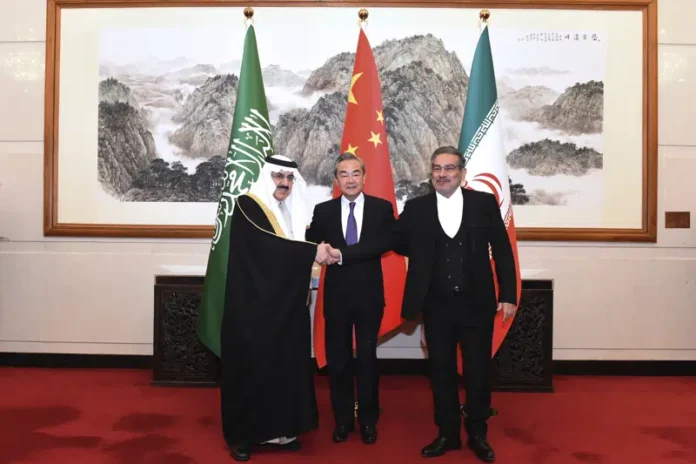BEIJING (AP) — China said Saturday it had no ulterior motives and was not trying to fill a ‘blank’ in the Middle East after hosting talks in which Iran and Saudi Arabia agreed to resume diplomatic ties.
A deal announced Friday to restore ties between Iran and Saudi Arabia after seven years and reopen their embassies is a sign that China considered a major diplomatic victory.
The State Department, citing an anonymous spokesperson, said China has “no vested interests” and opposes geopolitical competition in the region.
China said it will continue to help Middle Eastern countries “resolve differences through dialogue and consultation, and jointly promote lasting peace and stability.”
A statement posted on the State Department website said it “respects the status of Middle Eastern countries as masters of the region and rejects geopolitical competition in the Middle East.”
“China has no intention to and will not seek to fill so-called vacuum or put up exclusive blocs,” it said, in an apparent reference to the U.S. “China will continue to contribute its insights and proposals to realizing peace and tranquility in the Middle East and play its role as a responsible major country in this process.”
Following Friday’s announcement, China’s senior diplomat Wang Yi said the agreement showed China was a “reliable mediator” that had “faithfully fulfilled its duties as the host.”
Notably, Wang also stated that “this world has more than just the Ukraine question and there are still many issues affecting peace and people’s lives.”
China has been heavily criticized for failing to condemn Russia’s invasion and for accusing the U.S. and NATO of provoking the conflict. A Chinese proposal calling for a cease-fire and peace negotiations between Russia and Ukraine went nowhere, largely because of China’s perceived backing of Russia.
However, in the Middle East, China is viewed as a neutral party, with strong ties to both Iran and Saudi Arabia, as well as Israel and the Palestinian Authority.
China last month hosted Iran’s hard-line President Ebrahim Raisi, and is a top purchaser of Saudi oil. Chinese leader Xi Jinping visited Riyadh in December for meetings with oil-rich Gulf Arab nations crucial to China’s energy supplies, and China’s special envoy for the Middle East — a position specially created in 2002 — has made frequent trips to the region. China sells drones and other weapons to countries in the region, but not on the scale of the United States.
China, in concert with authoritarian Russia, has steadily crushed the US-led Western liberal order, seeking to seize opportunities when Washington’s attention is diverted.
China has previously tried aggressively to forge ties in the South Pacific, signing security agreements with the Solomon Islands that could confirm the presence of Chinese naval vessels and security forces. The United States, Australia and others quickly rushed to strengthen ties in the Pacific, and China’s efforts to strike similar agreements with other island nations ultimately failed.
Talks between Iran and Saudi Arabia were based on a “noble initiative” and they personally agreed to sponsor negotiations that lasted from Monday to Friday.
Friday, April 19, 2024
More
© London Post, All Rights Reserved by Independent Media Group UK Limited.






